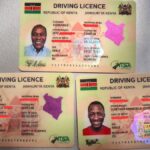The transport sector in Kenya is evolving rapidly, with digital platforms like Uber, Bolt, and Little transforming how Kenyans commute. These Transport Network Companies (TNCs) have revolutionized urban mobility, creating opportunities for entrepreneurs and drivers alike. However, operating a TNC in Kenya requires compliance with regulations set by the National Transport and Safety Authority (NTSA). A critical step is obtaining a Transport Network Company Licence through the NTSA portal. This comprehensive guide provides everything you need to know about the application process, requirements, costs, and tips for success, tailored for the Kenyan market in 2025.
Understanding the Transport Network Company Licence
A Transport Network Company Licence is a mandatory permit for any company operating a digital platform that connects passengers with drivers for hire in Kenya. This includes ride-hailing services, delivery platforms, and other transport-related digital businesses. The NTSA regulates TNCs under the Transport Network Company Regulations, 2020, ensuring safety, compliance, and fair competition in the transport sector.
The licence ensures that TNCs adhere to strict standards, including driver vetting, vehicle safety, and data protection. With the rise of digital transport solutions in cities like Nairobi, Mombasa, and Kisumu, securing this licence is essential for businesses aiming to operate legally and build trust with customers.
Why You Need a TNC Licence
- Legal Compliance: Operating without a valid TNC licence is illegal and can lead to hefty fines or business closure.
- Consumer Trust: A licensed TNC assures passengers and drivers of safety and professionalism.
- Market Access: The licence allows you to operate across Kenya, tapping into the growing demand for digital transport services.
- Regulatory Protection: Compliance with NTSA regulations protects your business from legal disputes and operational risks.
Step-by-Step Guide to Applying for a TNC Licence on the NTSA Portal
Applying for a Transport Network Company Licence involves a straightforward yet meticulous process on the NTSA’s TIMs (Transport Integrated Management System) portal. Below is a detailed breakdown of the steps to ensure a smooth application process.
Step 1: Register on the NTSA TIMs Portal
The NTSA TIMs portal is the official platform for all transport-related applications in Kenya. To begin:
- Visit the TIMs Portal: Go to timsvir.ntsa.go.ke.
- Create an Account: Click on the “Register” button and provide your business details, including your company name, email, and phone number.
- Verify Your Account: After registration, you’ll receive a verification email or SMS. Follow the instructions to activate your account.
- Log In: Use your credentials to access the portal and navigate to the “Licensing” section.
Pro Tip: Ensure your email and phone number are active, as NTSA communicates updates through these channels. If you encounter issues, contact NTSA support at info@ntsa.go.ke or call +254-709-932000.
Step 2: Gather Required Documents
The NTSA requires specific documents to process your TNC licence application. Ensure all documents are valid and up-to-date to avoid delays. Below is the complete list of requirements:
- Copy of Certificate of Incorporation: Proof that your company is legally registered with the Business Registration Service (BRS) in Kenya.
- Certificate of Registration by the Data Protection Commissioner: Compliance with the Data Protection Act, 2019, is mandatory for TNCs handling passenger and driver data.
- Valid Business Permit or Trade Licence: Issued by the county government where your business operates (e.g., Nairobi City County).
- KRA PIN Registration Certificate: Your company’s tax identification from the Kenya Revenue Authority (KRA).
- Valid KRA Tax Compliance Certificate: Proof that your business is tax-compliant.
- Current CR12: A document from the BRS confirming your company’s directors and shareholders, valid within the last three months.
- Copies of ID Cards or Alien/Foreigners Certificate: For all directors and key personnel, including non-Kenyan nationals where applicable.
- Contract Agreement: Signed agreements with registered vehicle owners and drivers outlining terms of engagement.
- Code of Conduct: A documented policy for employees, drivers, and vehicle owners, ensuring professionalism and safety.
- Lease Agreement: If your business operates from leased premises, provide a valid lease agreement.
Important Note: All documents must be scanned clearly and uploaded in PDF format on the TIMs portal. Incomplete or unclear submissions may lead to rejection.
Step 3: Submit Your Application
Once you’ve gathered all documents, follow these steps to apply:
- Access the TNC Licence Application Form: On the TIMs portal, select “Transport Network Company Licence” under the licensing section.
- Fill in Business Details: Provide your company’s name, registration number, physical address, and contact details.
- Upload Documents: Attach all required documents in the specified format.
- Review and Submit: Double-check your application for accuracy before submitting. Errors in details like KRA PIN or CR12 can cause delays.
Step 4: Pay the Application Fee
The Transport Network Company Licence fee is Ksh. 100,000, payable through the TIMs portal via mobile money (M-Pesa) or bank transfer. Follow these steps:
- Select Payment Option: Choose your preferred payment method on the portal.
- Complete Payment: For M-Pesa, enter your phone number and confirm the transaction. For bank transfers, use the provided NTSA account details.
- Save Payment Confirmation: Download or screenshot the payment receipt for your records.
Note: The licence is valid for one year, with a renewal fee of Ksh. 100,000. Ensure timely renewal to avoid penalties.
Step 5: Application Processing and Approval
The NTSA processes TNC licence applications within three working days, provided all documents are complete and fees are paid. You’ll receive updates via email or SMS. If approved, you’ll download your digital licence from the TIMs portal. If rejected, NTSA will provide reasons, allowing you to rectify and resubmit.
Key Challenges and How to Overcome Them
Applying for a TNC licence can be daunting, especially for startups or small businesses. Below are common challenges and solutions based on user experiences and NTSA guidelines.
Challenge 1: Portal Technical Issues
The NTSA TIMs portal occasionally faces glitches, such as slow loading or failed uploads. For instance, a 2023 post on X highlighted difficulties with pending applications due to portal errors.
Solution:
- Check Internet Connection: Ensure a stable internet connection before accessing the portal.
- Clear Cache: Clear your browser cache or try a different browser if the portal is unresponsive.
- Contact NTSA Support: Reach out to NTSA via email or phone for assistance with technical issues.
Challenge 2: Document Rejections
Incomplete or outdated documents are a common reason for application rejections.
Solution:
- Verify Document Validity: Ensure your CR12 is less than three months old and your tax compliance certificate is current.
- Follow Format Guidelines: Upload documents in PDF format and ensure scans are legible.
- Consult a Lawyer: For complex documents like contract agreements or codes of conduct, seek legal advice to ensure compliance.
Challenge 3: Data Protection Compliance
The requirement for a Data Protection Commissioner certificate can be confusing, as many startups are unaware of the Data Protection Act requirements.
Solution:
- Register with ODPC: Visit the Office of the Data Protection Commissioner (ODPC) website (odpc.go.ke) to apply for registration.
- Implement Data Policies: Develop a data protection policy for your platform, outlining how passenger and driver data is handled.
- Seek Expert Guidance: Engage a data protection consultant to ensure compliance with Kenyan laws.
Costs and Timelines
- Application Fee: Ksh. 100,000 (non-refundable).
- Renewal Fee: Ksh. 100,000 annually.
- Processing Timeline: Three working days, assuming all documents are complete.
- Additional Costs: Budget for legal fees (e.g., drafting contracts), county permits, and ODPC registration fees (approximately Ksh. 10,000–20,000).
Tips for a Successful TNC Licence Application
To streamline your application and enhance your chances of approval, consider the following:
- Start Early: Begin gathering documents weeks in advance to avoid last-minute issues.
- Engage Professionals: Hire a lawyer or consultant familiar with NTSA regulations to review your application.
- Stay Updated: Follow NTSA announcements on their official website or X account (@NTSA_KE) for policy changes.
- Test the Portal: Familiarize yourself with the TIMs portal by exploring its features before starting your application.
- Maintain Records: Keep digital and physical copies of all submitted documents and payment receipts.
The Broader Context: TNCs in Kenya’s Transport Sector
Kenya’s transport sector is a cornerstone of the economy, contributing significantly to GDP and employment. The rise of TNCs has disrupted traditional taxi and boda boda services, offering convenience and affordability. However, this growth has also raised concerns about driver welfare, passenger safety, and regulatory compliance.
In 2024, NTSA reported increased enforcement actions against unlicensed TNCs, emphasizing the importance of the Transport Network Company Licence. The authority has also introduced stricter vehicle inspection standards and driver training programs to enhance road safety, as highlighted in a 2024 joint press statement on road safety.
Moreover, the Data Protection Act, 2019, has made data compliance a critical aspect of TNC operations. With platforms handling sensitive user data, the ODPC certificate ensures that TNCs protect customer privacy, aligning with global standards.
Opportunities for TNC Operators
Securing a TNC licence opens doors to numerous opportunities:
- Market Expansion: Operate in multiple Kenyan cities and even explore regional markets.
- Partnerships: Collaborate with vehicle owners, drivers, and tech providers to scale your platform.
- Innovation: Introduce features like eco-friendly rides or women-only services to differentiate your brand.
- Investor Appeal: A licensed TNC is more attractive to investors seeking compliant and scalable businesses.
Frequently Asked Questions
How long does it take to get a TNC licence?
The NTSA processes applications within three working days if all requirements are met.
Can individuals apply for a TNC licence?
No, only registered companies with a Certificate of Incorporation can apply.
What happens if I operate without a TNC licence?
Operating without a licence is illegal and may result in fines, vehicle impoundment, or business closure.
Is the TNC licence renewable?
Yes, the licence is valid for one year and requires a Ksh. 100,000 renewal fee annually.
Obtaining a Transport Network Company Licence through the NTSA portal is a critical step for any business aiming to thrive in Kenya’s dynamic transport sector. By following the steps outlined—registering on the TIMs portal, gathering required documents, paying the Ksh. 100,000 fee, and ensuring compliance—you can secure your licence within three working days. Despite challenges like portal glitches or document rejections, careful preparation and adherence to NTSA guidelines will ensure success.
As Kenya’s transport landscape continues to evolve, a TNC licence positions your business for growth, compliance, and customer trust. Whether you’re launching a new ride-hailing platform or scaling an existing one, this guide equips you with the knowledge to navigate the process confidently. Start your application today and join the ranks of Kenya’s leading Transport Network Companies!





